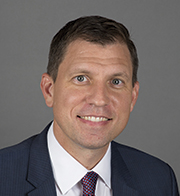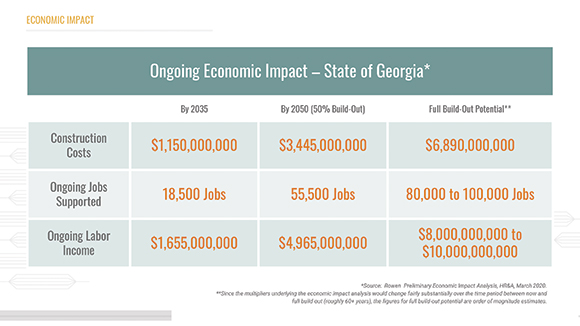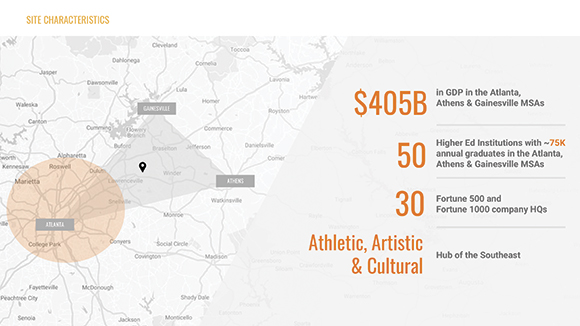More than a concept, “It’s definitely a done deal,” says Mason Ailstock about a 2,000-acre knowledge district called Rowen taking shape in rural eastern Gwinnett County, Georgia.
“Rowen” means second harvest. It’s a fitting moniker for a project aimed at fostering research and higher education collaboration in key industries on land used for generations for more traditional farming. Ailstock, who has extensive experience in research park planning and administration, including serving as chief operating officer at the Research Triangle Park in Raleigh, is president and CEO of the independent and non-profit Rowen Foundation. Its mission: “To be a catalyst for education, research, innovation and transformation through the creation of a global destination which recognizes stewardship of the land as the cornerstone of an inspired community.”

"It’s about the connection between education, innovation and economic development.”
—Mason Ailstock, president and CEO, Rowen Foundation
“We have been working very quietly with the county for the past 18 months or so with the previous Gwinnett County Commission Chairwoman, Charlotte Nash, and others on a vision of creating a unique innovation destination in part of the rapidly growing and diversifying county,” says Ailstock. “I’ve been helping them think about not only the real estate and having a great economic development opportunity. But how do we make that opportunity transformative, make it multigenerational and focused on a knowledge economy that leverages the resources at the University of Georgia and Georgia Tech and Georgia Gwinnett College and many others? It’s about the connection between education, innovation and economic development.”
A ROWEN DATA PROFILE


Part of the Transportation Solution
The Rowen site is located at the intersection of the Atlanta, Athens and Gainesville MSAs. After identifying the property, the Foundation arranged a loan from the Development Authority of Gwinnett County in August 2020 to purchase the acreage. Current work involves understanding the capacity of the site, says Ailstock, to understand the infrastructure needs and transportation planning, “so we can be part of the transportation solution in Gwinnett and not just create the 18,000 jobs we have projected by 2035.” Part of the property straddles highway 316, connecting Athens — home of the University of Georgia — and I-85.
“Half my day is spent on the planning and development of infrastructure and site readiness and talking to the economic development leaders,” says Ailstock. “The other half is spent with the community, the commissioners and building awareness of Rowen as a place that’s unique. We’re not going to build an urban center or lifestyle center or office park. It won’t be a residential development. It will be focused on research and partnerships with higher education.”
The Rowen vision sees this happening primarily in the spheres of medicine, agriculture and the environment. A Foundation document explains:
Medicine: Rowen will cultivate further innovations in medicine for Georgia — where health and medicine are significant drivers of employment — and the world through new approaches to medical care, technologies and therapies, population health and health equity. Rowen will help create space for the increasing importance of data and cyber security in the medical field, including biotechnology research and more.
Agriculture: Rowen will build on Georgia’s ongoing commitment to agriculture by providing a natural space for researchers to improve the efficiency, resilience and productivity of crop and animal production via digital and high-tech agriculture; resilience and biodiversity; food systems improvement; and biological, chemical and engineering technology.
Environment: Rowen will further Georgia’s commitment to emerging innovation in environmental sciences and green energy to improve society’s response to climate and social issues by focusing on green architecture and engineering; green economy innovation; ecological resilience and climate; and energy generation, usage and storage.
Today and Tomorrow
Public meetings in recent months have revealed a keen interest in Rowen from local residents and community leaders, says Ailstock. “There have been a lot of good, thoughtful questions about the timing of development, the types of uses that would be there, what a public-private partnership really means and how we envision working with the community in programming the site. There are questions about how we will incorporate trails and parks and leverage a lot of the open space so that it’s a statewide asset, not just a development. We have a vision for economic development and these facilities, but we also have a tremendous vision about partnering with the county and creating trains and outdoor, public venues for music and gatherings. The Foundation will invite all of the public into Rowen and what it becomes.”
Development of Rowen will get under way in the first quarter of 2023, when a building can open and connect to county sewer and water mains. “There’s a lot we can do between now and then, including selling some acres and building a multi-tenant building and having a facility for university collaboration,” says Ailstock. “We’re working on the state level on recruitment with the Department of Economic Development to find the right types of companies to partner with. We’re not looking to just do a transaction — it’s all mission-driven. The purpose behind the project is like what we had at RTP, where we had a set of covenants, architectural guidelines — things that will allow the Rowen Foundation to be the steward of the project for the next 60 years.”

